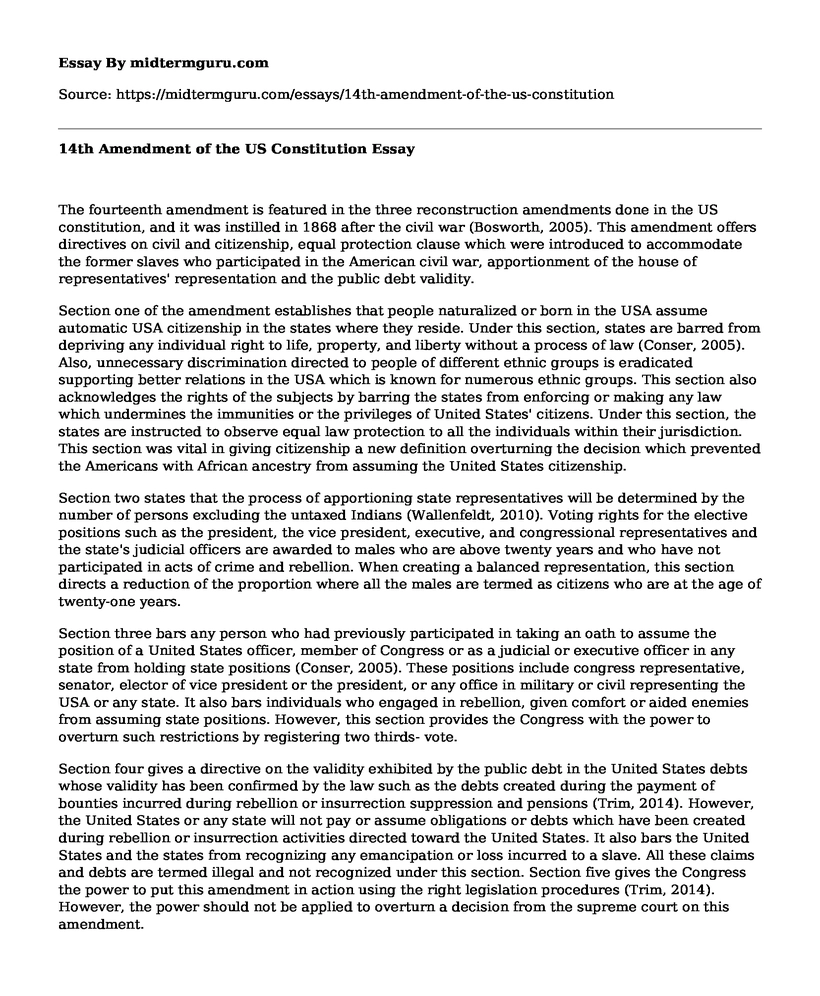The fourteenth amendment is featured in the three reconstruction amendments done in the US constitution, and it was instilled in 1868 after the civil war (Bosworth, 2005). This amendment offers directives on civil and citizenship, equal protection clause which were introduced to accommodate the former slaves who participated in the American civil war, apportionment of the house of representatives' representation and the public debt validity.
Section one of the amendment establishes that people naturalized or born in the USA assume automatic USA citizenship in the states where they reside. Under this section, states are barred from depriving any individual right to life, property, and liberty without a process of law (Conser, 2005). Also, unnecessary discrimination directed to people of different ethnic groups is eradicated supporting better relations in the USA which is known for numerous ethnic groups. This section also acknowledges the rights of the subjects by barring the states from enforcing or making any law which undermines the immunities or the privileges of United States' citizens. Under this section, the states are instructed to observe equal law protection to all the individuals within their jurisdiction. This section was vital in giving citizenship a new definition overturning the decision which prevented the Americans with African ancestry from assuming the United States citizenship.
Section two states that the process of apportioning state representatives will be determined by the number of persons excluding the untaxed Indians (Wallenfeldt, 2010). Voting rights for the elective positions such as the president, the vice president, executive, and congressional representatives and the state's judicial officers are awarded to males who are above twenty years and who have not participated in acts of crime and rebellion. When creating a balanced representation, this section directs a reduction of the proportion where all the males are termed as citizens who are at the age of twenty-one years.
Section three bars any person who had previously participated in taking an oath to assume the position of a United States officer, member of Congress or as a judicial or executive officer in any state from holding state positions (Conser, 2005). These positions include congress representative, senator, elector of vice president or the president, or any office in military or civil representing the USA or any state. It also bars individuals who engaged in rebellion, given comfort or aided enemies from assuming state positions. However, this section provides the Congress with the power to overturn such restrictions by registering two thirds- vote.
Section four gives a directive on the validity exhibited by the public debt in the United States debts whose validity has been confirmed by the law such as the debts created during the payment of bounties incurred during rebellion or insurrection suppression and pensions (Trim, 2014). However, the United States or any state will not pay or assume obligations or debts which have been created during rebellion or insurrection activities directed toward the United States. It also bars the United States and the states from recognizing any emancipation or loss incurred to a slave. All these claims and debts are termed illegal and not recognized under this section. Section five gives the Congress the power to put this amendment in action using the right legislation procedures (Trim, 2014). However, the power should not be applied to overturn a decision from the supreme court on this amendment.
References
Bosworth, M. (2005). Encyclopedia of prisons & correctional facilities. Thousand Oaks, Calif: Sage Publications.
Conser, J. A. (2005). Law enforcement in the United States. Sudbury, Mass: Jones and Bartlett Publishers.
Trim, George. (2014). Know Thy Law: The Amendments. Bloomington: Authorhouse.
Wallenfeldt, J. H. (2010). The American Civil War and Reconstruction: People, politics, and power. New York, NY: Britannica Educational Pub. in association with Rosen Educational Services.
Cite this page
14th Amendment of the US Constitution. (2022, Oct 17). Retrieved from https://midtermguru.com/essays/14th-amendment-of-the-us-constitution
If you are the original author of this essay and no longer wish to have it published on the midtermguru.com website, please click below to request its removal:
- Essay on Exxon Valdez Oil Spill
- Essay on Thoughts and Feelings About the Poem: A Little Learning
- Impact of Extracting and Transporting Petroleum on Environment
- Protests, Crisis, and Countercultures Worksheet
- The Argument Against the Paris Accord by President Trump
- The Cost of Capital - Paper Example
- Paper Example on State's Rights: the Role of the Federal Government and the Constitution







